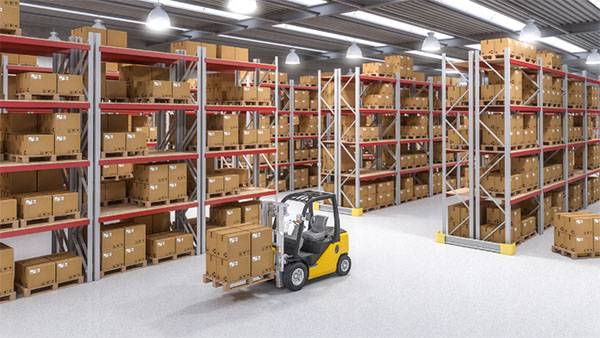Implementing critical technologies like WMS has a direct impact on warehousing performance and efficiency. Keep reading to obtain an in-depth understanding.

Introduction
Warehouse efficiency can be considered as one of the most critical strategic goals and differentiators in logistics organizations, and, naturally, warehouse technologies will directly impact efficiency as well as warehouse performance. Without an efficiently operating warehouse, the business might be forced to increase its workforce to maintain higher service levels.
However, this action might not be exempted from drawbacks. Increasing the workforce results in a decrease in profit margins and leads to an operation that is packed with human error. As a result, warehouses are looking to fortify themselves with technologies that would automate repetitive tasks, provide better solutions and reduce manual errors.
The mindset around warehouses is changing rapidly. They are not just places for stockpiling goods but an indispensable part of a lean and streamlined supply chain. With global e-commerce giants emphasizing building warehouses in small cities as well and increasing the capacity of already established warehouses, the onus is on intelligent technologies and how well they are boosting the warehousing performance and efficiency.
A Brief Insight Into the Warehouse Management System (WMS)
One of the most obvious ways to improve warehouse performance and reap healthy financial benefits is to invest in a warehouse management system (WMS). A WMS is nothing but a software application that is customized for the particular warehouse where it is employed and caters to specific requirements of the same warehouse. A tailor-made WMS supports and optimizes all of the above, from general warehousing operations to distribution center management.
One of the growing trends over the last decade has been increasing the functionality of a distribution center by employing automation. However, the machines need to be controlled for optimum results, and the machine data needs to be analyzed constantly for a streamlined warehouse operation. A customized WMS will do all this and more.
Global Warehouse Management System Market Overview and Growth Drivers
The global WMS market value was estimated to be USD 2.64 billion in 2020 and is expected to display a CAGR of 15.3% in the focus period of 2021 to 2028. Since WMS has proved to enhance the efficiency of warehousing operations amidst rising customer demands, the growth of the WMS market has been quite prolific across the globe. WMS finds its applications in several sectors like manufacturing, healthcare, and retail, where it tackles complex, sophisticated warehousing operations, and less complicated resource-oriented operations.
Some of the Critical Factors That Are Triggering the Growth of WMS
- The changing supply chain model of product manufacturers
- The need for manufacturers to curtail costs and automate warehouse management services
- Rapidly changing consumer demands across transport, retail and logistics sectors
- The ability to ship products faster using the shortest shipping routes
As a result, WMS has started playing a pivotal role in B2B distribution companies, third-party logistics, and other manufacturing companies. However, cloud-based WMS services have assumed the forefront and have overshadowed the popularity of on-premise solutions. With low upfront costs, cloud-based WMS can be implemented seamlessly in a warehouse as they are compatible with other supply chain elements like slotting management, yard management, business analytics, transportation management systems, etc.
Characteristics of WMS That Amplify Warehouse Performance and Efficiency
The Introduction of dimensioning systems and mobile technologies is already taking warehousing operations to a newer level. However, these warehousing technological revolutions that are responsible for more efficient warehousing can only be leveraged using a robust WMS.
Best-of-breed WMS are those that provide a level of functionality par excellence and ease to integrate with other technological disruptions inside the warehouse. Warehouse productivity is directly dependent on the WMS in concern. WMS helps businesses benefit from technological innovations that amp up warehouse efficiency and performance.
The essential characteristics of best-of-breed WMS that offer a boost in warehousing efficiency are as follows.
- Mobile-friendliness: A mobile-friendly WMS enables warehouse employees to manage their work using multiple mobile technologies ranging from smartphones to tablets. However, a native mobile application or a responsive web application is needed to integrate various mobile devices into the WMS successfully.
- Seamless integration with cost-cutting benefits: Best-of-breed WMS has become special because of its ability to integrate with other systems seamlessly. Such integrations are cost-effective as well, giving best-of-breed WMS an edge over the others. For this, the WMS needs to provide a reliable and well-documented API whose costs can be evaluated using monthly subscriptions, cost per usage model, or the salesforce model.
- Workflow and process-oriented functions: Several small and mid-sized warehouses are experiencing high workforce turnover rates. In such a scenario, it is indeed a challenge to keep things smooth while maintaining a superfluous flow of goods without any errors. Hence, the WMS needs to define and enforce warehouse processes through workflow engines while measuring process efficiency and employee productivity.
Although most businesses would love to have ERPs in place, the high cost associated with ERPs makes it almost impossible for small and mid-sized logistics companies to afford one. However, having the best-of-breed WMS can prove equally beneficial without weighing down on the coffers.
Final Thoughts
Online purchasing is a growing trend that has been attributed to the growth of warehousing operations. The COVID-19 pandemic and its immediate effects like lockdowns, social distancing, stay-at-home directives, etc., have led more people worldwide to pursue online purchasing. As a result, e-commerce and third-party logistics industries have witnessed an incredible demand in WMS. Global e-commerce giants are also ramping up the demand for WMS while establishing new distribution centers globally.
While new warehouse technologies and innovations have made warehouses more efficient and the overall businesses more competitive, a WMS or best-of-breed WMS is not the end of it. As observed in 1965 by Gordon Moore, the evolution of technology will constantly accelerate, and companies willing to embrace and implement them will remain competitive and profitable in the long run.
